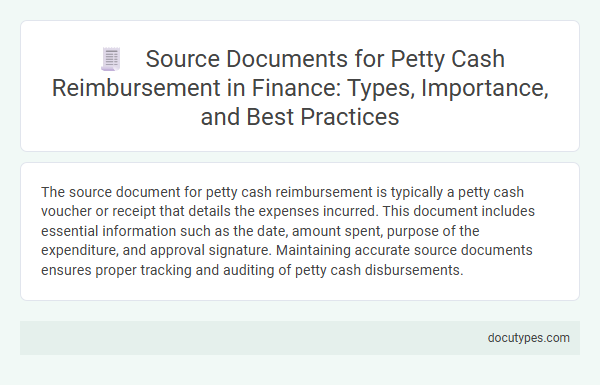The source document for petty cash reimbursement is typically a petty cash voucher or receipt that details the expenses incurred. This document includes essential information such as the date, amount spent, purpose of the expenditure, and approval signature. Maintaining accurate source documents ensures proper tracking and auditing of petty cash disbursements.
Introduction to Petty Cash Reimbursement in Finance
Petty cash reimbursement is a process in finance where small expenses paid out of a petty cash fund are replenished. The source document for this reimbursement is essential to ensure accurate financial records and accountability.
- Petty Cash Voucher - This document records details of the expenses and serves as proof for reimbursement.
- Receipts and Invoices - These support the voucher by providing evidence of the actual purchases made from petty cash.
- Reimbursement Request Form - You submit this form to authorize the replenishment of the petty cash fund based on documented expenses.
Defining Source Documents in Petty Cash Management
What is the source document for petty cash reimbursement? Source documents in petty cash management are original records that validate expenses incurred. These documents include receipts, invoices, or vouchers that provide proof of transactions for reimbursement purposes.
Types of Source Documents Used for Petty Cash Reimbursement
The source document for petty cash reimbursement is essential for verifying and authorizing the expenses incurred. Common types of source documents include receipts, invoices, and payment vouchers that provide detailed proof of transactions. You must retain these documents to ensure accurate record-keeping and smooth reimbursement processes.
Importance of Proper Source Documentation for Petty Cash
The source document for petty cash reimbursement is typically a petty cash voucher or receipt that details the amount spent, the date, and the purpose of the expense. This document serves as proof for the cash disbursed and ensures accurate tracking of petty cash transactions.
Proper source documentation for petty cash is crucial for maintaining financial accuracy and accountability within an organization. It helps prevent misuse of funds by providing a clear audit trail and supports compliance with internal controls and external regulations. Without valid source documents, the reconciliation of petty cash accounts becomes challenging, increasing the risk of errors and financial discrepancies.
Common Examples of Petty Cash Source Documents
Petty cash reimbursement requires source documents that verify the expenses made from the petty cash fund. Common examples of petty cash source documents include receipts, invoices, and payment vouchers. These documents provide proof of transactions and support accurate financial record-keeping in the finance department.
Best Practices for Collecting and Storing Petty Cash Source Documents
The source document for petty cash reimbursement is typically the original receipt or invoice that validates the expenditure. Proper collection and storage of these source documents are essential for accurate financial tracking and auditing.
- Retention of Original Receipts - Maintain all original receipts to verify petty cash transactions and support reimbursement claims.
- Systematic Organization - Store source documents in a dedicated, secure filing system categorized by date, purpose, or department for easy retrieval and review.
- Regular Audits - Implement routine checks of petty cash source documents to ensure compliance with company policies and detect any discrepancies promptly.
Verification and Approval Process of Petty Cash Source Documents
The source document for petty cash reimbursement is typically a petty cash voucher or receipt that records the details of the expense. This document verifies the purpose, amount, and date of the transaction, ensuring accurate tracking of petty cash usage.
Verification involves cross-checking the receipts against the approved petty cash policy and confirming that expenses are legitimate and within set limits. Your petty cash reimbursement request must receive approval from designated personnel before funds are disbursed, maintaining financial control and accountability.
Legal and Compliance Considerations for Petty Cash Documentation
| Topic | Details |
|---|---|
| Source Document for Petty Cash Reimbursement | Receipts, invoices, and vouchers serve as the primary source documents for petty cash reimbursement. These documents provide proof of authorized expenses and support accurate tracking of petty cash disbursements. |
| Legal Considerations | Maintaining detailed and accurate petty cash documentation is essential for compliance with financial regulations and auditing standards. Proper source documents ensure transparency and help prevent misuse or misappropriation of funds. Legal frameworks such as the Sarbanes-Oxley Act emphasize the need for reliable internal controls over cash transactions. |
| Compliance Requirements | Organizations must retain source documents for a specified period, often dictated by tax authorities and regulatory bodies. These documents must include date, amount, description of expense, and approval signatures. Consistent documentation supports regulatory compliance, facilitates external audits, and reduces the risk of financial penalties. |
| Best Practices | Implementing standardized petty cash forms, digital record-keeping, and periodic reconciliations enhances accuracy and compliance. Training employees on the importance of submitting complete source documents fosters accountability and aligns petty cash processes with company policies and legal standards. |
Common Challenges in Managing Petty Cash Source Documents
The source document for petty cash reimbursement is typically a petty cash voucher or receipt that verifies the expenses incurred. This document serves as proof for the amount spent and ensures transparency in financial records.
Common challenges in managing petty cash source documents include maintaining accurate records and preventing misplacement or loss of receipts. You must implement strict tracking and reconciliation processes to avoid discrepancies and ensure accountability.
What Is the Source Document for Petty Cash Reimbursement? Infographic

